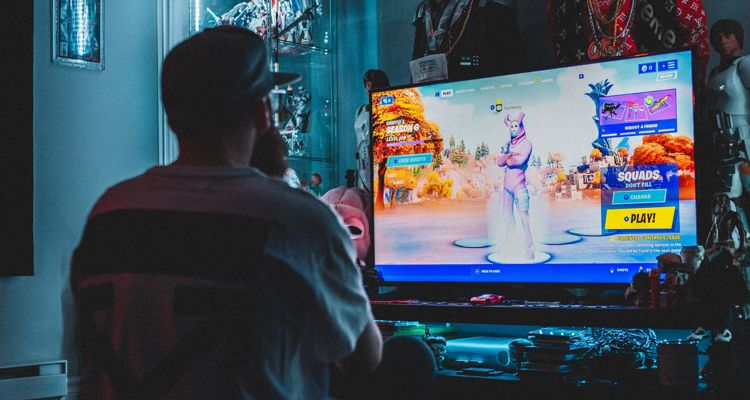Photo Credit: Erik Mclean
Music and gaming are so intertwined that many gamers associate certain songs with gaming franchises. These synch deals are multi-faceted, and game developers face unique challenges when it comes to licensing music.
A recent report by GamesIndustryBiz highlights how the needs of the gaming industry differ from film and TV. “We have gone from primarily background use in many classic titles to deeply integrated features such as in-game radio stations, artist skins with music stems built into abilities, rhythm games, and in-game concerts,” says Gavin Johnson, Head of Gaming at Monstercat. Monstercat is an electronic music label that has a partnership with Rocket League, a hugely popular game often described as playing ‘Hot Wheels soccer.’
The complex web of music licensing is a place of pitfalls for inexperienced game developers. The recent past is littered with games that had to be removed from their storefronts due to music licensing conflicts. Grand Theft Auto: Vice City disappeared from Steam in 2012 due to licensing issues for Michael Jackson’s “Wanna Be Startin’ Somethin’.” The game soon returned to the storefront, but the Jackson track is now absent from the versions now available for sale.
Remedy Entertainment’s Alan Wake was removed from PC and consoles in 2017 due to music licensing issues. The soundtrack for that game features artists like Roy Orbison, Nick Cave & The Bad Seeds, David Bowie, and Harry Nilsson at the end of each chapter. But Remedy only licensed the use of the music for seven years – which meant the game couldn’t be sold while rights were being renegotiated.
So why didn’t Remedy just remove the ‘problematic’ songs? It’s a lot more complex than you think. “We don’t have the resources to go back to a seven year old game and rework the code etc. Far more complicated than you think,” Remedy Entertainment told fans in 2017. It took Remedy nearly a year and a half to renegotiate the rights to those songs.
Not every game has survived a music licensing issue. SEGA’s spy thriller RPG Alpha Protocol remains missing from Steam because of music licensing issues. The Japanese company clarified in 2019 that it had only licensed the music appearing on the soundtrack for nine years.
What are the biggest challenges in music licensing for games?
Music licensing for games is just as complex as navigating licensing for film or TV. The copyright for songs and recordings are separate, so publishers who want both need both the song license and a recording license. Early Guitar Hero games navigated this issue by only featuring covers of classic rock songs. This way, the publisher only needed the song license, not the recorded license.
Song rights are a difficult process to navigate since there can be many owners. All owners need to agree to the license, which can make renegotiation a lengthy and difficult process.
Finally, copyright laws differ all over the world. It makes the licensing process much more difficult as games have become a global phenomenon. Working with trusted labels and publishing partners and keeping good relationships with them becomes a part of the job for large game developers like EA. Lori Cromwell-Charron is EA’s Senior Associate for Music Licensing and she says it’s a challenge she enjoys.
“Across all these spaces, you’re still researching rights holders, determining splits, tracking down clearances from somtimes elusive artists all while making sure everyone agrees on the best terms,” Cromwell-Charron told GamesIndustryBiz.
“When creating an interesting musical landscape to cover that much time, you end up licensing anywhere from 40 to 100 or more tracks with at least two – but sometimes six or more – rights holders per track. Getting a wish list of this size cleared on time and within budget is definitely a challenge, but it’s one that I enjoy.”
“The challenge for music licensors is to work within our legacy framework to find solutions that allow production teams and creative teams to implement all the new and innovative ways they come up with to incorporate music into our games,” adds Cromwell-Charron.
“How do you deliver fresh content throughout a game’s increasingly long life cycle? How do you treat collaborative sessions where artists and players create music together within the live gaming space. How do you allow an artist to move from the gaming space to the internet broadcast space to the live performance space while having her music seamlessly move with her? We don’t want to stifle creativity because the current licensing process hasn’t yet caught up, so we also have to get creative with our licensing partners,” Cromwell-Charron says.
The way music licensing is thought about between music and gaming is evolving to include backward compatibility, remasters, remakes, and re-releases of older games. Music licenses are evolving to ensure that games can retain their music forever with perpetuity licenses in some rare cases.
“There are real consequences to improperly using music that someone else owns, but you don’t need a full-time music licensing team to secure music rights,” says EA’s Cromwell-Charron. Building relationships before delving too deep into game development. But there are also rights holders will pre-cleared catalogs that offer a one-stop option for a particular fee.

